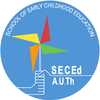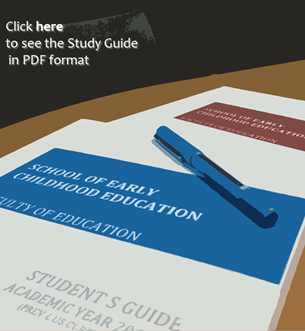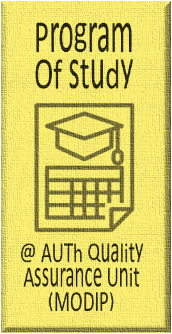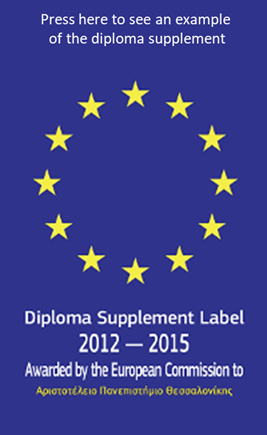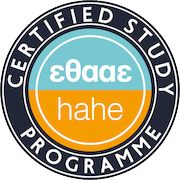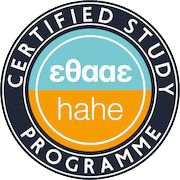The School of Early Childhood Education (SECEd) awards the students, upon completion of their studies, the academic qualification “Ptychion” (Degree) in Early Childhood Education. The programme and the studies regulations, as well as the postgraduate studies, are defined by the existing provisions, which are valid for all universities in Greece.
Parallel to their theoretical training, students perform a practicum at nursery schools located in the city of Thessaloniki and nearby areas, as well as at the AUTH “Day Care Unit”, which operates at the University premises.
Students are admitted on the basis of national level examinations. University or Technological Educational Institutes graduates can also be admitted on the basis of graduate admission examinations.
- Qualification awarded: Ptychion (Degree) in Early Childhood Education
- Level of qualification: Undergraduate
- Specific admission requirements: Upper secondary degree (6 years of studies). National level examination
Qualification requirements and regulations, profile of the programme, key learning outcomes
In order to obtain the degree (Ptychion) from the School of Early Childhood Education the students must attend and successfully pass the exams in compulsory and elective compulsory courses.
The undergraduate course programme offered by the School of Early Childhood Education is interdisciplinary and aims at creating educationalists for preschool-age children, and scientists in the field of education and teaching in general.
By means of the learning outcomes, the programme aims at providing the graduates with the knowledge and skills necessary to promote the science of Education, to adapt to the scientific and educational changes and to contribute through their research to the development and modern applications of said science.
Upon successful fulfilment of the qualification requirements, the graduates are able to:
- Design curricula based on an in-depth understanding of child development.
- Flexibly use various teaching methods and means depending on the children’s needs, particularities and interests.
- Apply, critically study and evaluate early education curricula.
- Respect and acknowledge diversity.
- Work individually or within a team in interdisciplinary environments with international characteristics.
- Communicate with children, colleagues, families and the broader community.
- Create and preserve safe and healthy learning environments. Apply cognitive and metacognitive learning strategies.
- Creatively express themselves in various fields.
- Conduct research on issues regarding the development, nurture and education of preschool-age children.
Moreover, the School’s graduates are able to provide services within formal education institutions as well as non-formal education providers for young children, and to organise and conduct educational research.
Besides basic knowledge and skills, the School’s graduates also acquire knowledge and skills relating to communicating in a foreign language and via ICTs.
A scale of 1 to 10 applies to the marks of each subject in the Hellenic Higher Education:
- Excellent: 8,50-10
- Very good: 6,50-8.49
- Good: 5,00-6.49
- Unsatisfactory: 0.00 - 4.99
- Minimum pass mark: 5
Official programme duration
8 SEMESTERS, 240 ECTS.
A full academic year is equivalent to 60 ECTS units and each semester to 30 ECTS (European Credit Transfer System) (1ECTS= 25 hours). Compliance with the ECTS (European Credit Transfer and Accumulation System) regulations stated in 2007, when the Greek Legislation was harmonized with the relevant European one (Ministerial Decision no Φ.5/89656/β3, art. 1-3, Hellenic Government Gazette no1466/2007/B). Each course is credited with a number of ECTS (>=2) according to the student workload required for attendance hours, laboratory work, extra classes, practicum etc.
Students should pass at least:
- 20 base subjects 120 ECTS
- 10 direction subjects 60 ECTS
- 1 subject from other school of the university 6 ECTS
- 1 compulsory foreign language subject 6 ECTS
- 2 compulsory subjects of Practice 48 ECTS
The number of offered subjects is usually around 30 in each category (depending on the availability of teaching staff)
During the first 4 semesters, students choose only Base subjects (20 out of 30, 5 in each semester)
At the final 4 semesters (5 to 8), students choose only among Direction subjects (10 out of 30) and attend the 2 obligatory subjects of Practice, while they choose a foreign language subject (usually English) and a subject from another school of Aristotle University
Optionally, one can produce an undergraduate thesis (collecting 18 ECTS, instead of 3 direction subjects), or can participate to an Erasmus Program (at 7th semester and collect 30 ECTS, instead of 5 direction subjects).
